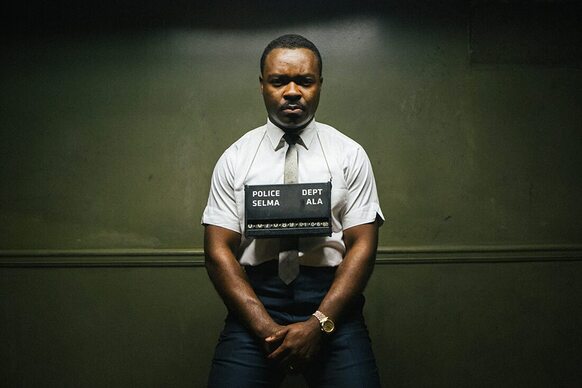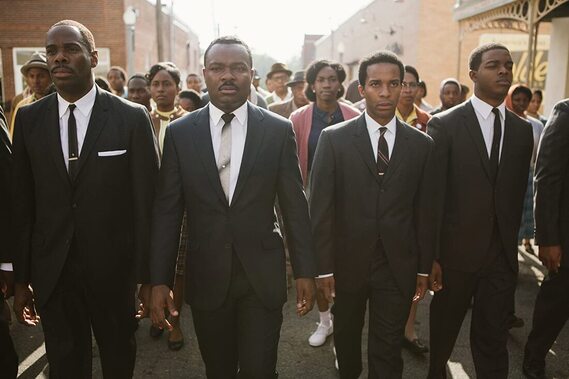SELMA
****
Director: Ava DuVernay
Screenwriter: Paul Webb
Principal cast:
David Oyelowo
Tom Wilkinson
Oprah Winfrey
Tim Roth
Carmen Ejogo
Jim France
Country: UK/USA/France
Classification: M
Runtime: 128 mins.
Australian release date: 12 February 2015
The USA is sometimes referred to as ‘the land of the free’ but how ironic this is when one looks back at the country’s recent history, particularly the bloody civil rights campaigns of the ‘60s held to secure equal voting rights. The right to vote was first guaranteed to black Americans (or at least black males) in 1870, with the passage of the 15th Amendment, but for nearly 100 years afterwards, that right was systematically obstructed in many places across the nation. Ava DuVernay’s Selma, the passionate portrayal of this fight for civil liberty, covers the period between the pastor and activist Dr. Martin Luther King Jr.’s acceptance of the Nobel Peace Prize in December 1964, to the signing of the Voting Rights Act by President Lyndon Johnson, in August 1965. In terms of fighting for their rights, this was one of the greatest challenges faced by the African-American community in the 20th century; a community living alongside a nation of whites, many of whom treated them as an inferior race - a period of history when segregation was the order of the day.
When, early in the film, we witness the civil rights activist Annie Lee Cooper (Oprah Winfrey) attempting to answer a number of totally absurd questions in order to register for the vote, you start to comprehend the depth of the injustices faced by black Americans of the day. Annie is asked to name every one of Alabama’s 67 judges and, when she can’t, she is refused registration; a test no white person would be expected to take. In this moment, DuVernay and screenwriter Paul Webb set the tone for the rest of the film. It’s not a comfortable ride, but then it’s not a comfortable story, reminding people as it does of America’s shameful history when it comes to race relations.
In March 1965, three attempts were made to march across the Edmund Pettus Bridge in Selma, Alabama, on the route to Montgomery, the state capital. On the first attempt, 600 marchers were tear-gassed and severely beaten, resulting in the day becoming known as “Bloody Sunday” when the images of this officially sanctioned brutality were televised to a horrified nation. The second attempt, headed by Dr. King two days later, was aborted because of the threat of violence from the well-equipped police waiting with guns and batons on the far side of the bridge; this became known as “Turn Around Tuesday.” The third attempt, starting on 21 March, was successful and the rest, as they say, is history.
What is not so widely known however, is that around this time there was a series of meetings with the then President of the United States, Lyndon B. Johnson (Tom Wilkinson) and Dr. King (David Oyelowo) who, in his eloquent manner, tried to make the President come to terms with the plight of African Americans and to not go down in history as a man with no vision for the future. On the other hand, LBJ had the devil’s advocate in his ear in the form of Governor of Alabama George Wallace (Tim Roth), who was, along with much of the white population of his state, an unabashed racist and bigot. The other major player in this drama was King’s wife Coretta Scott King (Carmen Ejogo), a woman who was caught between trying to raise a family in peace and supporting her husband while not knowing when, or if, he would return home safely. Without exception, the performances in this film are all excellent. The scenes between Oyelowo and Wilkinson are compelling and Roth’s portrayal of Governor Wallace makes you squirm in your seat.
Selma is a very solid depiction of this dismal period of American history, as frame by frame the story unfolds and the violent situation escalates, more people start to join in the protest. We see King as an extraordinary man, yet one with all the flaws of his sex, and equally as important, we see the many lesser-known women and men who contributed to the story. DuVernay’s direction does not sensationalise events - if anything, she and Webb keep things at such a measured pace that, even though you are witnessing a story that is shocking in every way, somehow it just doesn’t quite bring your blood to the boil. Selma has been nominated for two Academy Awards (Best Picture and Best Original Song) at the forthcoming Oscars, overlooking the incredible performance of David Oyelowo, a tough decision indeed. See it for his performance if nothing else.
Screenwriter: Paul Webb
Principal cast:
David Oyelowo
Tom Wilkinson
Oprah Winfrey
Tim Roth
Carmen Ejogo
Jim France
Country: UK/USA/France
Classification: M
Runtime: 128 mins.
Australian release date: 12 February 2015
The USA is sometimes referred to as ‘the land of the free’ but how ironic this is when one looks back at the country’s recent history, particularly the bloody civil rights campaigns of the ‘60s held to secure equal voting rights. The right to vote was first guaranteed to black Americans (or at least black males) in 1870, with the passage of the 15th Amendment, but for nearly 100 years afterwards, that right was systematically obstructed in many places across the nation. Ava DuVernay’s Selma, the passionate portrayal of this fight for civil liberty, covers the period between the pastor and activist Dr. Martin Luther King Jr.’s acceptance of the Nobel Peace Prize in December 1964, to the signing of the Voting Rights Act by President Lyndon Johnson, in August 1965. In terms of fighting for their rights, this was one of the greatest challenges faced by the African-American community in the 20th century; a community living alongside a nation of whites, many of whom treated them as an inferior race - a period of history when segregation was the order of the day.
When, early in the film, we witness the civil rights activist Annie Lee Cooper (Oprah Winfrey) attempting to answer a number of totally absurd questions in order to register for the vote, you start to comprehend the depth of the injustices faced by black Americans of the day. Annie is asked to name every one of Alabama’s 67 judges and, when she can’t, she is refused registration; a test no white person would be expected to take. In this moment, DuVernay and screenwriter Paul Webb set the tone for the rest of the film. It’s not a comfortable ride, but then it’s not a comfortable story, reminding people as it does of America’s shameful history when it comes to race relations.
In March 1965, three attempts were made to march across the Edmund Pettus Bridge in Selma, Alabama, on the route to Montgomery, the state capital. On the first attempt, 600 marchers were tear-gassed and severely beaten, resulting in the day becoming known as “Bloody Sunday” when the images of this officially sanctioned brutality were televised to a horrified nation. The second attempt, headed by Dr. King two days later, was aborted because of the threat of violence from the well-equipped police waiting with guns and batons on the far side of the bridge; this became known as “Turn Around Tuesday.” The third attempt, starting on 21 March, was successful and the rest, as they say, is history.
What is not so widely known however, is that around this time there was a series of meetings with the then President of the United States, Lyndon B. Johnson (Tom Wilkinson) and Dr. King (David Oyelowo) who, in his eloquent manner, tried to make the President come to terms with the plight of African Americans and to not go down in history as a man with no vision for the future. On the other hand, LBJ had the devil’s advocate in his ear in the form of Governor of Alabama George Wallace (Tim Roth), who was, along with much of the white population of his state, an unabashed racist and bigot. The other major player in this drama was King’s wife Coretta Scott King (Carmen Ejogo), a woman who was caught between trying to raise a family in peace and supporting her husband while not knowing when, or if, he would return home safely. Without exception, the performances in this film are all excellent. The scenes between Oyelowo and Wilkinson are compelling and Roth’s portrayal of Governor Wallace makes you squirm in your seat.
Selma is a very solid depiction of this dismal period of American history, as frame by frame the story unfolds and the violent situation escalates, more people start to join in the protest. We see King as an extraordinary man, yet one with all the flaws of his sex, and equally as important, we see the many lesser-known women and men who contributed to the story. DuVernay’s direction does not sensationalise events - if anything, she and Webb keep things at such a measured pace that, even though you are witnessing a story that is shocking in every way, somehow it just doesn’t quite bring your blood to the boil. Selma has been nominated for two Academy Awards (Best Picture and Best Original Song) at the forthcoming Oscars, overlooking the incredible performance of David Oyelowo, a tough decision indeed. See it for his performance if nothing else.

